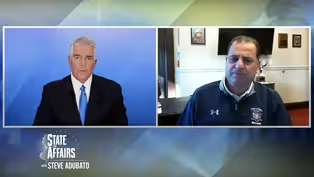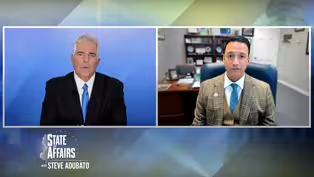State of Affairs with Steve Adubato
Seton Hall professor analyzes results of the 2024 Election
Clip: Season 8 Episode 25 | 9m 1sVideo has Closed Captions
Seton Hall professor analyzes results of the 2024 Election
Matthew Hale, Ph.D., Associate Professor of the Department of Political Science & Public Affairs at Seton Hall University, joins Steve Adubato to analyze the implications of the 2024 presidential election results, campaign strategies, and voter turnout.
Problems playing video? | Closed Captioning Feedback
Problems playing video? | Closed Captioning Feedback
State of Affairs with Steve Adubato is a local public television program presented by NJ PBS
State of Affairs with Steve Adubato
Seton Hall professor analyzes results of the 2024 Election
Clip: Season 8 Episode 25 | 9m 1sVideo has Closed Captions
Matthew Hale, Ph.D., Associate Professor of the Department of Political Science & Public Affairs at Seton Hall University, joins Steve Adubato to analyze the implications of the 2024 presidential election results, campaign strategies, and voter turnout.
Problems playing video? | Closed Captioning Feedback
How to Watch State of Affairs with Steve Adubato
State of Affairs with Steve Adubato is available to stream on pbs.org and the free PBS App, available on iPhone, Apple TV, Android TV, Android smartphones, Amazon Fire TV, Amazon Fire Tablet, Roku, Samsung Smart TV, and Vizio.
Providing Support for PBS.org
Learn Moreabout PBS online sponsorship[INSPRATIONAL MUSIC STING] - Hi everyone, Steve Adubato, we kick off the program with Professor Dr. Matthew Hale, associate professor at the Department of Political Science and Public Affairs at our higher ed partner, Seton Hall University.
Matt, good to see you buddy.
- Hey, good to be here.
- We're taping this after the 2024 Presidential and Congressional elections.
Let's say immigration, the economy, inflation, key issues.
Now, let's talk government and public policy.
Where do you think the most significant changes President Trump and the GOP Congress will be making moving into 2025?
- So I think one of the first things he's gonna do is something on immigration.
What that is, we don't know.
He's talked about deporting millions of people, he's talked about troops on the border.
You know, that's something that I think is big and splashy, and he can do a lot because of, you know, being the Commander-in-Chief.
So I would expect that immigration is gonna be sort of front and center.
- Matt, hold on one second.
Mass deportation on day one.
Explain to me, both of us are students of public policy, government programming, and implementation.
Tell me how the heck you do that.
- You don't, and any sort of mass deportation is not something that you can do overnight.
But the point, I think, that Trump is going to attempt to show something on the border dramatic and quick.
So planning how you would move 10 million people is a logistic effort that, you know, would take an enormous amount of time.
But moving troops to the border, moving National Guard to the border, you know, that's certainly something that could happen pretty quickly.
- Let's talk tax policy.
There's a Washington Post story I was picking up on the wires that talks about one of the first actions President Trump and the Republican Congress will take, really involves the reauthorization of the 2017 tax cuts for most Americans, but especially wealthy Americans in corporations.
Do you expect those tax cuts to be extended, and in fact, Professor, expanded by giving greater tax breaks?"
- So I would imagine in the first year that the tax cuts that were enacted the first time around for President Trump, he's gonna do those again.
I would see that sort of, again, a kind of quick low-hanging fruit.
I would expect that in the later years, year two, year three, that that's when you would see even greater tax cuts for the wealthy and significantly more tariff attempts.
So I think that probably the first year, there's gonna be the tax cuts that have already existed, and then after that, they're gonna be expanded along with more tariffs.
Would you argue that the Democrats got destroyed in this election on the presidential side and on the congressional side, even though the country's relatively split down the middle, in large part because of an over obsession with the so-called culture wars?
- I absolutely do.
I think that, you know, if you look at nationally, one of the biggest ads against Kamala Harris was the one where she said she wanted to give gender reassignment surgery to transgender prisoners.
Now, you might have people- - To them and those, Trump... She's into them and those, Trump is into you and yours.
Was that the message that was so powerful?
- So it's not just that she is for other people, it's that it's unfair, it's that she's focusing on people...
The argument that was very successful is that she's focusing on people who aren't like me and my friends.
She's focusing on people that are different.
She's focusing on people that are not like us, and that was very, very effective.
- Us being whom, us being whom, Matt?
- I would say actually the biggest one is probably White working class voters.
And I would say, not just the working class, I think there's a number of people who think that these social issues are not where the focus needs to be.
And the focus needs to be on the economy, the focus needs to be on lowering the cost of milk, and that type of thing.
And so the Republicans were really, really effective at painting her as a crazy liberal, and that doesn't sell well with the majority of the electorate.
- Question, and looking back, is it clear to you that President Biden should have announced much longer, or be pressed to announce much earlier that he was not gonna run for reelection so that an open primary could have taken place, a competitive situation, and let the winner be the democratic nominee, 'cause that's not what happened, clearly?
- Absolutely, and you know, I think that cuts in a couple ways.
Remember that Harris had to sort of adopt a ground game and an apparatus from the Biden administration.
Had they had a primary, whoever won that primary would've had that ground game.
And the biggest reason that Harris lost is that that voter turnout in high Democratic areas, particularly cities, was not good.
Biden had 81 million votes, she's gonna have 74 million votes, maybe.
Trump only had 74 million this time, last time, he had 72.
So he didn't go up that much, she went down because people stayed home.
And that I think is because the shortness of the campaign, there wasn't sort of this long gear up that could get behind a candidate - Question, Matt, you deal with your students every day.
More and more younger people voted for President Trump.
Did you see that on campus?
- I did, you know, we did have a mix.
I'd say the majority tend to still be voting Democratic.
- Was it different by race, Matt, and gender?
- It was a bit of a mix.
You know, I don't think that...
I think there are African Americans on our campus who were voting for Trump.
I think that's something that wasn't expected.
But I think the thing is is that a lot of my students, and I think a lot of students and young people in general, really sort of unfortunately look at all politics, all, whether you're a Democrat, Republican, whether you're working in government, as corrupt and wrong and terrible, and the whole system is a mess.
And so when the whole system is a mess, you vote for someone who promises to smash it and change it and doesn't do things.
- But he was there before.
We saw what that presidency was.
He will fix it, he will clean it up?
- So there's no evidence that that's exactly what he is gonna do.
But there is evidence that he's gonna do things differently.
And I think for many people, all that mattered is we gotta do something different.
Whatever we're doing right now is not working, and so let's try something different.
The fact that most people can't identify exactly what he's gonna do is pretty terrifying.
But the fact is that he was the candidate that came across as, "I'm gonna do something different," and that was very appealing.
- Professor Matt Hale from Seton Hall University will continue not just to talk about the politics and the horse race, boring in a lot of ways, but rather about the policy implications, the impact on your life based on public policy from the presidency and Congress, and also the impact on the State of New Jersey.
My good friend, Matt Hale from Seton Hall, I'll see you soon on campus, my friend.
- All right, Steve, thanks so much.
- You got it, stay with us, we'll be right back.
- [Narrator] State of Affairs with Steve Adubato is a production of the Caucus Educational Corporation.
Celebrating 30 years in public broadcasting.
Funding has been provided by Holy Name.
Eastern Atlantic States Regional Council of Carpenters.
The Turrell Fund, a foundation serving children.
Horizon Blue Cross Blue Shield of New Jersey.
New Brunswick Development Corporation.
Johnson & Johnson.
Operating Engineers, Local 825.
New Jersey Sharing Network.
IBEW Local 102.
And by these public spirited organizations, individuals and associations committed to informing New Jersey citizens about the important issues facing the Garden State.
Promotional support provided byInsider NJ.
And by Northjersey.com and Local IQ.
- (Narration) Healing is never just about medicine and technology.
It has to go further than that.
It has to combine science with humanity.
It has to be our best medicine, combined with large doses of empathy, kindness, dignity and respect.
It has to be delivered by people who love what they do and who they do it for.
Holy Name.
Great medicine, soul purpose.
Sen. Sarlo addresses affordability & end-of-life care in NJ
Video has Closed Captions
Clip: S8 Ep25 | 9m 49s | Sen. Sarlo addresses affordability & end-of-life care in NJ (9m 49s)
Sen. Testa examines economy, border control, & clean energy
Video has Closed Captions
Clip: S8 Ep25 | 9m 50s | Sen. Testa examines economy, border control, & clean energy (9m 50s)
Providing Support for PBS.org
Learn Moreabout PBS online sponsorship
- News and Public Affairs

Top journalists deliver compelling original analysis of the hour's headlines.

- News and Public Affairs

FRONTLINE is investigative journalism that questions, explains and changes our world.












Support for PBS provided by:
State of Affairs with Steve Adubato is a local public television program presented by NJ PBS

